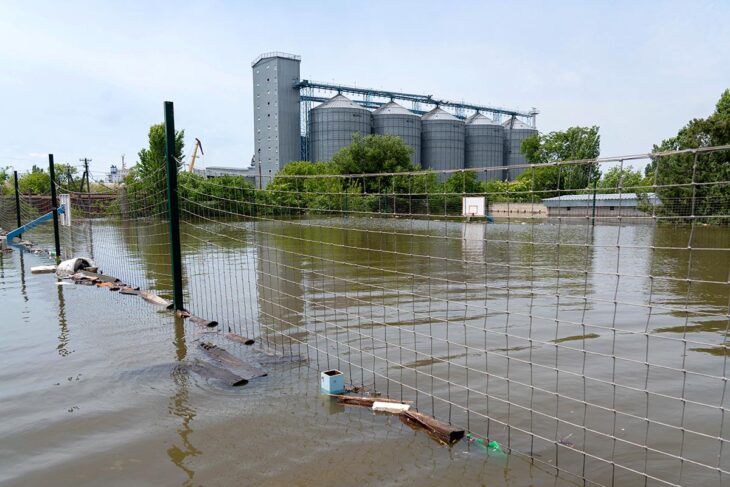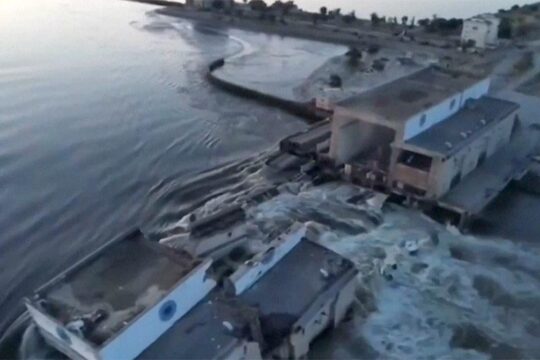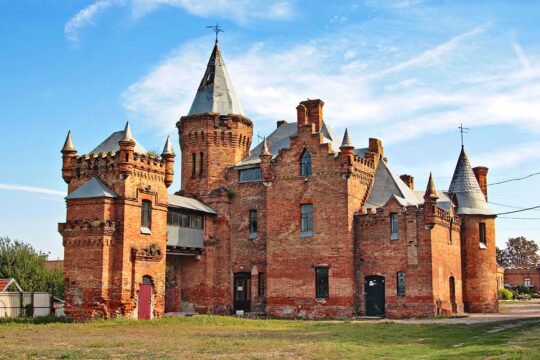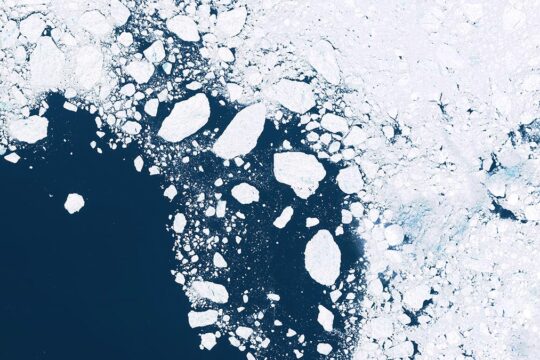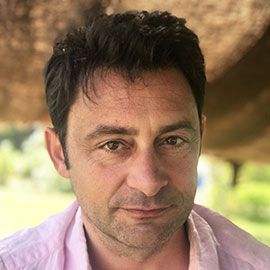"It's an ecological disaster comparable to Chernobyl [1986 nuclear disaster in Ukraine, 130 kilometres north of Kyiv]," says Maksym Popov, special advisor for environmental crimes to the Ukrainian Prosecutor General, in reference to damage caused by the explosion of the huge Nova Kakhovka dam on June 6.
“More than 150 prosecutors and more than 250 regional and national investigators are working on this investigation,” he explains. The investigation concerns three regions crossed by the Dnieper: Kherson, the area most affected by the flooding; Mykolaïv, downstream on the Crimean peninsula; and Zaporijjia, upstream, home to Europe's largest nuclear power plant whose cooling is partly dependent on the level of the Dnieper. It should be noted that in the event of an attack on the Zaporijjia power plant, the polluted water would no longer be held back by the dam and would flow unimpeded into the Black Sea.
On June 8, after 2,300 civilians had been evacuated from the flooded areas of Kherson, the Ukrainian president addressed "the world environmental protection community" in a speech broadcast online, calling on Russia to be held responsible for a "terrorist" act constituting "ecocide". Volodymyr Zelensky asked that Ukraine not be left to deal with this tragedy alone. Prosecutor Popov says it is indeed “important for the international community to realize the consequences of the war declared by the Russians". "There are no borders for the environment, and when the aggressor attacks it, it's not just Ukrainians who suffer: all ecological systems are interconnected," he says.
ICC visits the region
On June 11, representatives of the International Criminal Court (ICC) travelled to the Kherson region with Ukrainian Prosecutor General Andriy Kostin, Ukrainian media reports. They met regional prosecutors and visited flooded areas. They did not have access to the site of the Kakhovka dam, which is controlled by the Russian Federation. The investigation into the exact causes of the explosion can only be carried out with the support of intelligence services and open sources, notably satellite sources.
Moscow, at an urgent meeting convened by the UN Security Council on June 7, blamed Ukraine for the "sabotage". No independent investigation team has yet been able to visit the dam site. And strangely enough, according to Newsweek information, a week earlier on May 30 Russia adopted new legislation prohibiting the opening of investigations into accidents that might occur on "hydraulic structures" in the context of its military operations in the "annexed" Ukrainian regions of Donetsk, Luhansk, Kherson and Zaporijjia.
NGOs went too
“The devastation wrought by this disaster cannot be overstated and will undoubtedly be felt for years to come as entire industries, from irrigation to agriculture, water, fishing, livestock, and several more, now face the widespread, long-term, and severe impacts,” says in a press release Yousuf Syed Khan, a lawyer with the NGO Global Rights Compliance who was part of the Attorney General's delegation that visited the area on June 10 and 11. He argues that the "starvation" that could result from the disaster would constitute a war crime.
The Kakhovka affair is mobilizing many players in Ukraine, including several national and international organizations. "Because of the extent of the damage, Kakhovka has a good chance of being analyzed by the ICC," says Dmytro Koval, a lawyer with the Ukrainian NGO Truth Hounds, which has also given itself a mandate to document environmental crimes and support national and international investigations in Ukraine.
Ecocide, a crime under Ukrainian and Russian law
But on the specific question of environmental crime, Ukrainian legislation has nothing to be ashamed of when compared with the Rome Statute, the legal text governing the ICC. The latter does not include the crime of ecocide. Its Article 8 defines "widespread, long-term and severe damage to the natural environment" as a war crime, but requires proof of intentional action and its "excessive" character in relation to the expected military advantage. While these criteria may be met in the case of Kakhovka, they may make the ICC -- which, unlike in the case of other crimes, has not communicated on this issue -- hesitate to commit to this investigation.
Popov explains that under Ukrainian law, the article of the Criminal Code punishing “violations of the laws and customs of war” refers to “international instruments” and thus to the Additional Protocol to the Geneva Conventions, adopted in 1977 after the Vietnam War and the American Agent Orange bombings. This text prohibits the use of means of warfare likely to cause "widespread, long-term and severe" damage to the environment. It also protects "installations [civilian] containing dangerous forces" - namely dams, dykes and nuclear power plants - which must not be attacked during armed conflict.
But the major advantage of Ukrainian law is that it included ecocide in its 2001 criminal code -- a crime which, "for the moment, is not considered as a full-fledged crime throughout the world", stresses Popov. And while the definition of this crime - inherited from the Soviet Union and also existing in Russian law - is rather imprecise and has rarely been tried, it has the merit of existing. "We are pioneers and there is no precedent in the international system," says the special advisor for environmental crimes at the Ukrainian prosecutor's office. Since the start of the Russian invasion in February 2022, Ukraine has opened no fewer than 195 prosecutions for environmental crimes committed by Russian forces, qualifying them as war crimes. Among these cases, 15 are also qualified as ecocide, says Popov.
There are three main categories, he explains: attacks on civilian targets like water networks and fuel reserves, resulting in the contamination of air, soil and groundwater; hostilities in the Black Sea, threatening dolphins with extinction due to Russian navy sonar; and the partial or complete destruction of forests and nature reserves protected by international conventions.
Accumulating evidence
"We're not hoping for a trial in the short or medium term; right now, it's a matter of accumulating evidence," says Truth Hounds' Koval. He thinks the priority is to reorganize the files by region and type of crime, and to try to draw up individual cases. "Journalists are helping us in this task, as are many foreign lawyers," he says.
“These are systematic crimes, and we mustn't hurry,” says Popov. “Several cases are at the preliminary investigation stage, and it is essential to have technical assessments of the components contaminating the soil, water and air, based on samples, carried out at international level, as well as an estimate of the duration of the contamination.” Identification of the perpetrators and those who gave the orders is carried out in coordination with the security services, which, he says, is not the easiest part of the investigators' work.
The Kakhovka investigation, which is taking wide dimensions in Ukraine, has only just begun. “Ukraine is committed to examining all war-related criminal cases,” stresses the special advisor. “99% of the cases will be tried in Ukraine. But the ICC has its say. Representatives of the ICC came to the Kakhovka region. They can make their own conclusions.”


